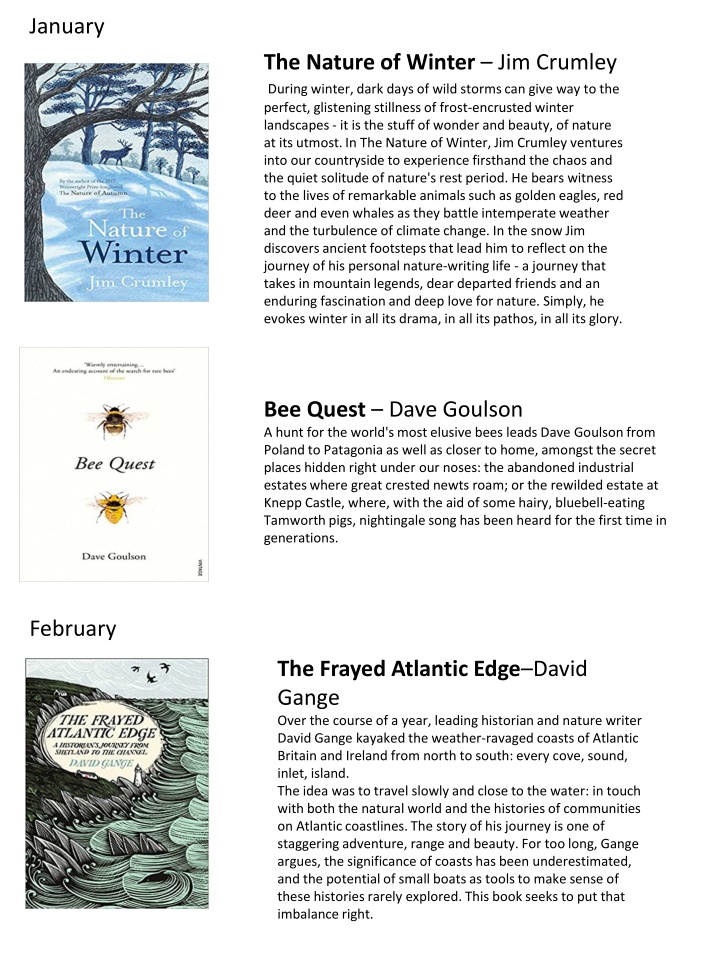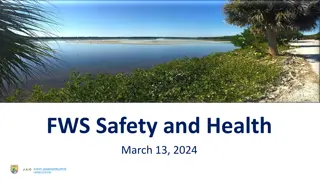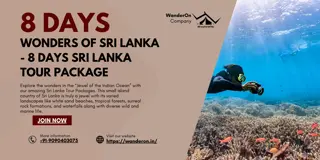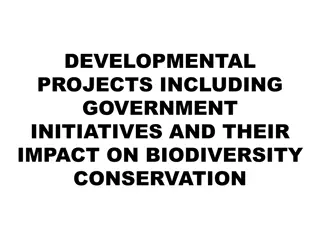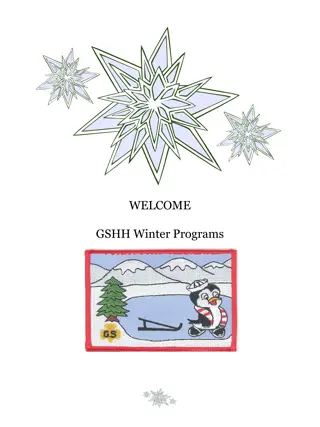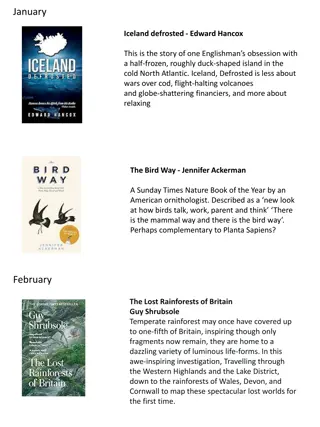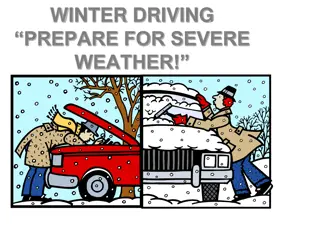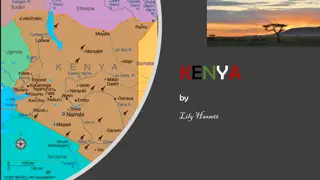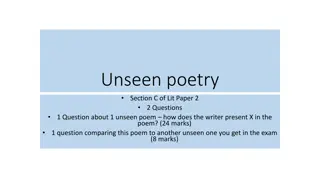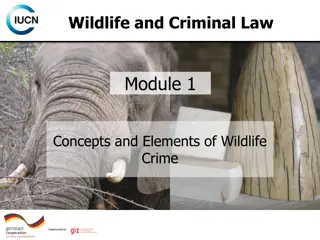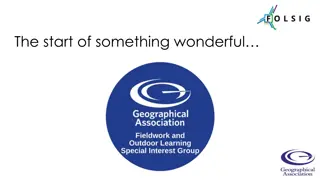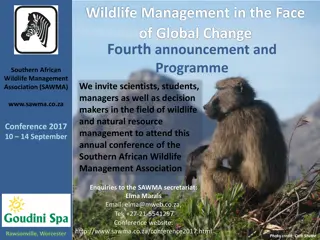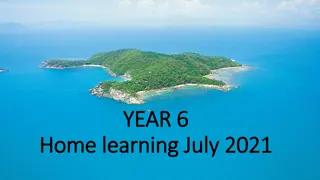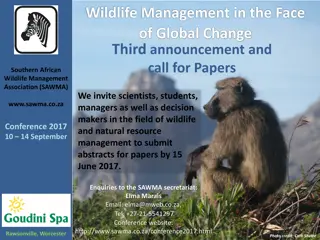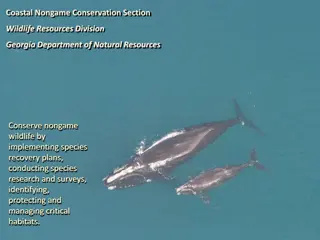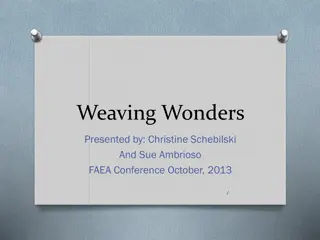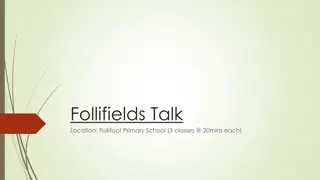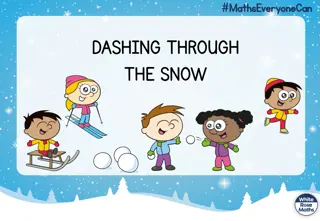Winter Wonders: Nature Exploration and Wildlife Encounters
Venture into the beauty and drama of winter with books like "The Nature of Winter" by Jim Crumley, "Bee Quest" by Dave Goulson, and "The Frayed Atlantic Edge" by David Gange. Explore the intricate lives of wildlife like golden eagles and cuckoos, witness the magic of the changing seasons, and delve into the importance of conservation and rewilding efforts. Discover the captivating stories of nature's resilience and the harmony of ecosystems in these enriching reads.
Uploaded on Sep 07, 2024 | 2 Views
Download Presentation

Please find below an Image/Link to download the presentation.
The content on the website is provided AS IS for your information and personal use only. It may not be sold, licensed, or shared on other websites without obtaining consent from the author.If you encounter any issues during the download, it is possible that the publisher has removed the file from their server.
You are allowed to download the files provided on this website for personal or commercial use, subject to the condition that they are used lawfully. All files are the property of their respective owners.
The content on the website is provided AS IS for your information and personal use only. It may not be sold, licensed, or shared on other websites without obtaining consent from the author.
E N D
Presentation Transcript
January The Nature of Winter Jim Crumley During winter, dark days of wild storms can give way to the perfect, glistening stillness of frost-encrusted winter landscapes - it is the stuff of wonder and beauty, of nature at its utmost. In The Nature of Winter, Jim Crumley ventures into our countryside to experience firsthand the chaos and the quiet solitude of nature's rest period. He bears witness to the lives of remarkable animals such as golden eagles, red deer and even whales as they battle intemperate weather and the turbulence of climate change. In the snow Jim discovers ancient footsteps that lead him to reflect on the journey of his personal nature-writing life - a journey that takes in mountain legends, dear departed friends and an enduring fascination and deep love for nature. Simply, he evokes winter in all its drama, in all its pathos, in all its glory. Bee Quest Dave Goulson A hunt for the world's most elusive bees leads Dave Goulson from Poland to Patagonia as well as closer to home, amongst the secret places hidden right under our noses: the abandoned industrial estates where great crested newts roam; or the rewilded estate at Knepp Castle, where, with the aid of some hairy, bluebell-eating Tamworth pigs, nightingale song has been heard for the first time in generations. February The Frayed Atlantic Edge David Gange Over the course of a year, leading historian and nature writer David Gange kayaked the weather-ravaged coasts of Atlantic Britain and Ireland from north to south: every cove, sound, inlet, island. The idea was to travel slowly and close to the water: in touch with both the natural world and the histories of communities on Atlantic coastlines. The story of his journey is one of staggering adventure, range and beauty. For too long, Gange argues, the significance of coasts has been underestimated, and the potential of small boats as tools to make sense of these histories rarely explored. This book seeks to put that imbalance right.
Cuckoo: Cheating by Nature Nick Davies Beloved as a herald of spring, cuckoos have held a place in our hearts for centuries. But for many other birds the cuckoo is a signal of doom, for it is nature's most notorious cheat. In this enormously engaging book, naturalist and scientist Nick Davies reveals how cuckoos deceive other species, uncovering an evolutionary race between cuckoos and the hosts. Cuckoo offers a new insight not only into the secret lives of these extraordinary birds, but also how cheating evolves and thrives in the natural world. March ReBirding Benedict McDonald Britain has all the space it needs for an epic return of its wildlife. Only six percent of our country is built upon. Contrary to popular myth, large areas of our countryside are not productively farmed but remain deserts of opportunity for both wildlife and jobs. It is time to turn things around. Praised as 'visionary' by conservationists and landowners alike, Rebirding sets out a compelling manifesto for restoring Britain's wildlife, rewilding its species and restoring rural jobs to the benefit of all Pig: tales from an organic farm Helen Browning In a frosty field on the longest night of the year, eight little piglets snuffle their first breaths, and jostle close to their mother to feed... Over the six months that follow, lifelong farmer Helen Browning and her partner Tim Finney record their adventures to show how pigs become the mischievous, competitive, intelligent and inventive animals that we know them to be. In doing so, they demonstrate why it is so crucial that the welfare of our farm animals - and equally, the way we manage our countryside - takes centre stage in the contemporary discussions around food, climate change and the loss of wildlife. Lyrically told and drawing on a lifetime's worth of knowledge, this is a timely and entrancing exploration of our relationship with farm animals, with nature, and with life itself.
April The Robin A Biography - Stephen Moss In The Robin Stephen Moss records a year of observing the robin both close to home and in the field to shed light on the hidden life of this apparently familiar bird. We follow its lifecycle from the time it enters the world as an egg, through its time as a nestling and juvenile, to the adult bird; via courtship, song, breeding, feeding, migration and ultimately, death. At the same time we trace the robin's relationship with us: how did this particular bird one of more than 300 species in its huge and diverse family find its way so deeply and permanently into our nation s heart and its social and cultural history?It s a story that tells us as much about ourselves as it does about the robin itself. In The Country Kenneth Allsop At the end of the 1960s, Kenneth Allsop, a famous television presenter and literary man-about-town, left London and settled amid the sunken lanes, ancient forests and chalk streams of west Dorset. He was at his very happiest here. He thought it the loveliest place on earth, and for three years he devoted a weekly newspaper column to his day-to-day life at the mill, brimming with humour and delight for the wildlife which shared his home. In the Country is not rustic or romantic. It is never unrealistic about agricultural modernisation and social change in the countryside. Yet, steeped with a deep sense of the past, Kenneth Allsop's writing speaks in defence of the natural world and stands firmly against the unchecked exploitation of the land A Single Swallow Horatio Clare From the slums of Cape Town to the palaces of Algiers, through Pygmy villages where pineapples grow wild, to the Gulf of Guinea where the sea blazes with oil flares, across two continents and fourteen countries - this epic journey is nothing to swallows, they do it twice a year. But for Horatio Clare, writer and birdwatcher, it is the expedition of a lifetime. Along the way he discovers old empires and modern tribes, a witch- doctor's recipe for stewed swallow, explains how to travel without money or a passport, and describes a terrifying incident involving three Spanish soldiers and a tiny orange dog. By trains, motorbikes, canoes, one camel and three ships, Clare follows the swallows from reed beds in South Africa, where millions roost in February, to a barn in Wales, where a pair nest in May. May
Nature's Architect: Beavers Return to Our Wild Landscape Jim Crumley Hundreds of years after their extinction in these isles, beavers are back in Britain. These highly skilled engineers of the natural world have been reintroduced at several sites across the UK and, even as they become established, are already having a dramatic effect on our wild landscapes. Here, leading nature writer Jim Crumley reveals the pioneering lifestyle of these intriguing and secretive creatures and considers the ecological and economic impact of the beaver reintroductions. Employing his trademark beautiful prose and empathy for life in the wild, Crumley considers the future for Britain's beavers and makes the case for giving them their freedom. June Tamed: Ten species that changed our world Prof. Alice Roberts For hundreds of thousands of years, our ancestors depended on wild plants and animals to stay alive until they began to tame them. Combining archaeology and cutting-edge genetics, Tamed tells the story of the greatest revolution in human history and reveals the fascinating origins of ten crucial domesticated species; and how they, in turn, transformed us. In a world creaking under the strain of human activity, Alice Roberts urges us to look again at our relationship with the natural world and our huge influence upon it. Braiding Sweet Grass Indigenous wisdom, scientific knowledge and teaching of plants Robin Wall Kimmerer Drawing on her life as an indigenous scientist, a mother, and a woman, Kimmerer shows how other living beings-asters and goldenrod, strawberries and squash, salamanders, algae, and sweetgrass-offer us gifts and lessons, even if we've forgotten how to hear their voices. In a rich braid of reflections that range from the creation of Turtle Island to the forces that threaten its flourishing today, she circles toward a central argument: that the awakening of a wider ecological consciousness requires the acknowledgment and celebration of our reciprocal relationship with the rest of the living world. For only when we can hear the languages of other beings will we be capable of understanding the generosity of the earth, and learn to give our own gifts in return.
July English Pastoral An inheritance James Rebanks English Pastoral is the story of an inheritance: one that affects us all. It tells of how rural landscapes around the world were brought close to collapse, and the age-old rhythms of work, weather, community and wild things were lost. And yet this elegy from the northern fells is also a song of hope: of how, guided by the past, one farmer began to salvage a tiny corner of England that was now his, doing his best to restore the life that had vanished and to leave a legacy for the future. This is a book about what it means to have love and pride in a place, and how, against all the odds, it may still be possible to build a new pastoral: not a utopia, but somewhere decent for us all. The Butterfly Isles A summer in search of Emperors and AdmiralsPatrick Barkham . Butterflies animate our summers but the fifty-nine species found in the British Isles can be surprisingly elusive. Some bask unseen at the top of trees in London parks; others lurk at the bottom of damp bogs in Scotland. A few survive for months, while other ephemeral creatures only fly for three days. Several are virtually extinct. This bewitching book charts Patrick Barkham's quest to find each of them - from the Adonis Blue to the Dingy Skipper - in one unforgettable summer. Wry, attentive, full of infectious delight and curiosity, written with a beautifully light touch, The Butterfly Isles is a classic of British nature writing. August Vesper Flights Helen McDonald Helen Macdonald brings together a collection of her best-loved writing along with new pieces covering a thrilling range of subjects. There are essays here on headaches, on catching swans, on hunting mushrooms, on twentieth-century spies, on numinous experiences and high-rise buildings; on nests and wild pigs and the tribulations of farming ostriches. Vesper Flights is a book about observation, fascination, time, memory, love and loss and how we make the world around us. Moving and frank, personal and political, it confirms Helen Macdonald as one of this century's greatest nature writers.
Peatlands - Robin A Crawford In this book Robin A. Crawford explores the peatlands of Lewis. He explains how they have come to be and also considers how peat has been used for millennia, principally as a fuel but also, amongst other things, as a key element in the whisky-making process. In describing the seasonal processes of cutting, drying, stacking, storing and burning, he reveals one of the key rhythms of island life, but his study goes well beyond this to include many other aspects, including the wildlife and folklore associated with these lonely, watery places. Widening his gaze to other peatlands in the country, he also reflects on the historical and cultural importance that peat has played, and continues to play, in the story of Scotland. September The Genius of Birds - Jennifer Ackerman In The Genius of Birds, acclaimed author Jennifer Ackerman explores the newly discovered brilliance of birds and how it came about. As she travels around the world to the most cutting-edge frontiers of research - the distant laboratories of Barbados and New Caledonia, the great tit communities of the United Kingdom and the bowerbird habitats of Australia, the ravaged mid-Atlantic coast after Hurricane Sandy and the warming mountains of central Virginia and the western states - Ackerman not only tells the story of the recently uncovered genius of birds but also delves deeply into the latest findings about the bird brain itself that are revolutionizing our view of what it means to be intelligent. Entangled Life - Martin Sheldrake Neither plant nor animal, they are found throughout the earth, the air and our bodies. They can be microscopic, yet also account for the largest organisms ever recorded. They enabled the first life on land, can survive unprotected in space and thrive amidst nuclear radiation. In fact, nearly all life relies in some way on fungi. These endlessly surprising organisms have no brain but can solve problems and manipulate animal behaviour with devastating precision. In giving us bread, alcohol and life-saving medicines, fungi have shaped human history, and their psychedelic properties have recently been shown to alleviate a number of mental illnesses. Their ability to digest plastic, explosives, pesticides and crude oil is being harnessed in break-through technologies, and the discovery that they connect plants in underground networks, the 'Wood Wide Web', is transforming the way we understand ecosystems. Yet over ninety percent of their species remain undocumented. Entangled Life is a mind-altering journey into a spectacular and neglected world, and shows that fungi provide a key to understanding both the planet on which we live, and life itself
October The Accidental Countryside - Stephen Moss In The Accidental Countryside, author and naturalist Stephen Moss makes a journey of discovery through Britain, in search of the hidden corners where wildlife survives against the odds. From Shetland s Iron Age stone structures to London s most modern skyscrapers, and from lowly railway cuttings to ornate stately gardens, Moss reveals the unlikely oases where wildlife thrives in areas originally created for human purposes. The result is a surprising and uplifting story of how we have influenced the landscape and wildlife of these crowded islands; and how wildlife has taken advantage of us even when we least expected it. Annie s Box - Randal Keynes The story of the personal tragedy that lay behind Darwin s revolutionary understanding of man s place in nature. Darwin s eldest daughter Annie died when she was only ten years old. In the writing case are keepsakes of her life that cast precious light on Darwin s work and on his love for his wife and children. Taking Annie s story as his starting point Randal Keynes brings together science and humanity in a ground-breaking book that makes a major contribution to our understanding of Charles Darwin. Randal Keynes, Darwin s great-great-grandson and the current guardian of Annie s box, conjures up a world in which great thinkers including Carlyle, Babbage and George Eliot were struggling with ideas that were to shake mankind to its core. At the forefront was Darwin himself, whose thinking about evolution and human nature was profoundly influenced by his life with his family, vividly picture in this intimate portrait of the man and his private world. November Antlers of Water Kathleen Jamie et al The first ever collection of contemporary Scottish writing on nature and landscape, Antlers of Water showcases the diversity and radicalism of new Scottish nature writing today. Edited, curated and introduced by the award-winning Kathleen Jamie, and featuring prose, poetry and photography, this inspiring collection takes us from walking to wild swimming, from red deer to pigeons and wasps, from remote islands to back gardens. With contributions from Amy Liptrot, Malachy Tallack, Chitra Ramaswamy, Jim Crumley, Amanda Thomson, Karine Polwart and many more, Antlers of Water urges us to renegotiate our relationship with the more-than-human world, in writing which is by turns celebratory, radical and political
Wildwood : A Journey Through Trees - Roger Deakin From the walnut tree at his Suffolk home, he embarks upon a quest that takes him through Britain, across Europe, to Central Asia and Australia, in search of what lies behind man's profound and enduring connection with wood and trees. Meeting woodlanders of all kinds, he lives in shacks and cabins, travels in search of the wild apple groves of Kazakhstan, goes coppicing in Suffolk, swims beneath the walnut trees of the Haut- Languedoc, and hunts bush plums with Aboriginal women in the outback. Perfect for fans of Robert Macfarlane and Colin Tudge, Roger Deakin's unmatched exploration of our relationship with trees is autobiography, history, traveller's tale and incisive work in natural history. It will take you into the heart of the woods, where we go 'to grow, learn and change. December Diary of a Young Naturalist Dara McAnulty Winner of the 2020 Wainwright Prize, Diary of a Young Naturalist chronicles the turning of Dara McAnulty's world, from spring to summer, autumn to winter, on his home patch, at school, in the wild and in his head. Evocative, raw and beautifully written, this very special book vividly explores the natural world from the perspective of an autistic teenager juggling homework, exams and friendships alongside his life as a conservationist and environmental activist. With a sense of awe and wonder, Dara describes in meticulous detail encounters in his garden and the wild, with blackbirds, whooper swans, red kites, hen harriers, frogs, dandelions, skylarks, bats, cuckoo flowers, Irish hares and many more species. The power and warmth of his words also draw an affectionate and moving portrait of a close-knit family making their way in the world The Outermost House Henry Beston A fragment of land in open ocean, the outermost beach of Cape Cod lies battered by winds and waves. It was here that the writer-naturalist Henry Beston spent a year in a tiny, two-roomed wooden house built on a solitary dune, writing his rapturous account of the changing seasons amid a vast, bright world of sea, sand and sky. Transforming the natural world into something mysterious, elemental and transcendent, Beston describes soaring clouds of migrating birds and butterflies; the primal sounds of the booming sea; luminous plankton washed ashore like stardust; the long-buried, blackened skeleton of an ancient shipwreck rising from the dunes during a winter storm; a single eagle in the endless blue. With its rhythmic, incantatory language and its heightened sensory power, The Outermost House is an American classic that changed writing about the wild: a hymn to ancient, eternal patterns of life and creation.
All Year The Stubborn Light of Things -Melissa Harrison A Londoner for over twenty years, moving from flat to Tube to air- conditioned office, Melissa Harrison knew what it was to be insulated from the seasons. Adopting a dog and going on daily walks helped reconnect her with the cycle of the year and the quiet richness of nature all around her: swifts nesting in a nearby church; ivy-leaved toadflax growing out of brick walls; the first blackbird's song; an exhilarating glimpse of a hobby over Tooting Common. Moving from scrappy city verges to ancient, rural Suffolk, where Harrison eventually relocates, this diary - compiled from her beloved Nature Notebook column in The Times - maps her joyful engagement with the natural world and demonstrates how we must first learn to see, and then act to preserve, the beauty we have on our doorsteps - no matter where we live. A perceptive and powerful call-to-arms written in mesmerising prose, The Stubborn Light of Things confirms Harrison as a central voice in British nature writing. .
